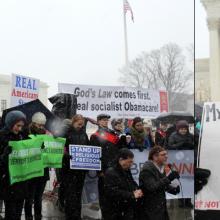Conestoga Wood Specialties
Closely held corporations cannot be compelled to pay for contraception coverage, the Supreme Court ruled Monday in its highly anticipated Burwell v. Hobby Lobby Stores case. The "contraceptive mandate" in the federal health care law was challenged under the Religious Freedom Restoration Act, which requires that the government show that a law doesn't "substantially burden" religious exercise.
According to SCOTUSBlog, the Court ruled that the government "has failed to show that the mandate is the least restrictive means of advancing its interest in guaranteeing cost-free access to birth control."
But the decision is applicable only to the contraceptive mandate, and does not apply to other health care mandates.
From Washington Post :
The justices’ 5-4 decision Monday is the first time that the high court has ruled that profit-seeking businesses can hold religious views under federal law. And it means the Obama administration must search for a different way of providing free contraception to women who are covered under objecting companies’ health insurance plans.
Hobby Lobby is an evangelical family-owned chain, and CEO David Green says that the Affordable Care Act infringed upon the family's religious freedom by compelling them to pay for certain contraceptives the family considers to be abortifacients, such as versions of the morning-after pill and IUDs.
Justices Ginsberg, Sotomayor, Breyer, and Kagan dissented.
Read the decision HERE.
The U.S. Supreme Court is expected to finally issue its ruling this week in the highly anticipated case of the craft companies vs. Obamacare.
Technically, it’s Sebelius v. Hobby Lobby and Conestoga Wood Specialties, a showdown over the Affordable Care Act’s contraception coverage mandate. The core legal question is whether a private company can have religious rights.
But to the general public, this is seen as a showdown between employers — the evangelical Green family behind Hobby Lobby and the Mennonite Hahn familythat owns the Conestoga cabinet company — and the employees’ personal reproductive choices under their insurance.
While conservatives have cast the battle as one for religious freedom, the general public may see it as a showdown over personal health choices.

